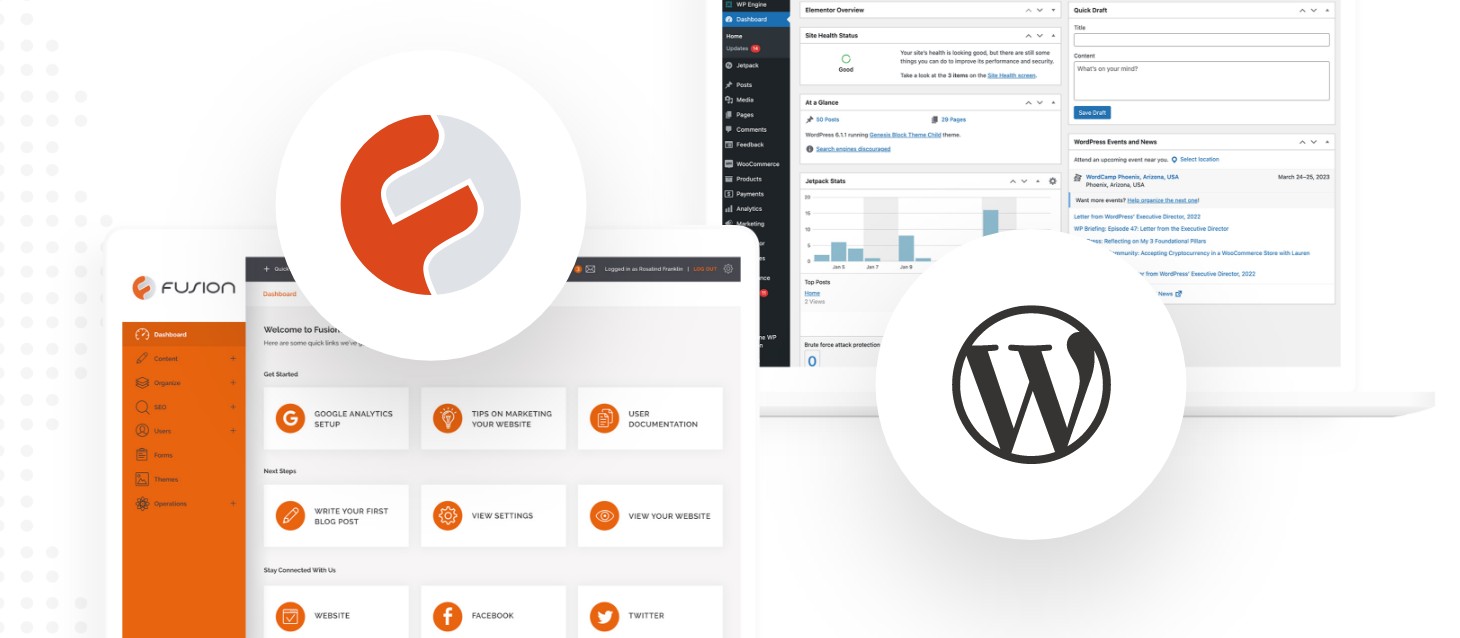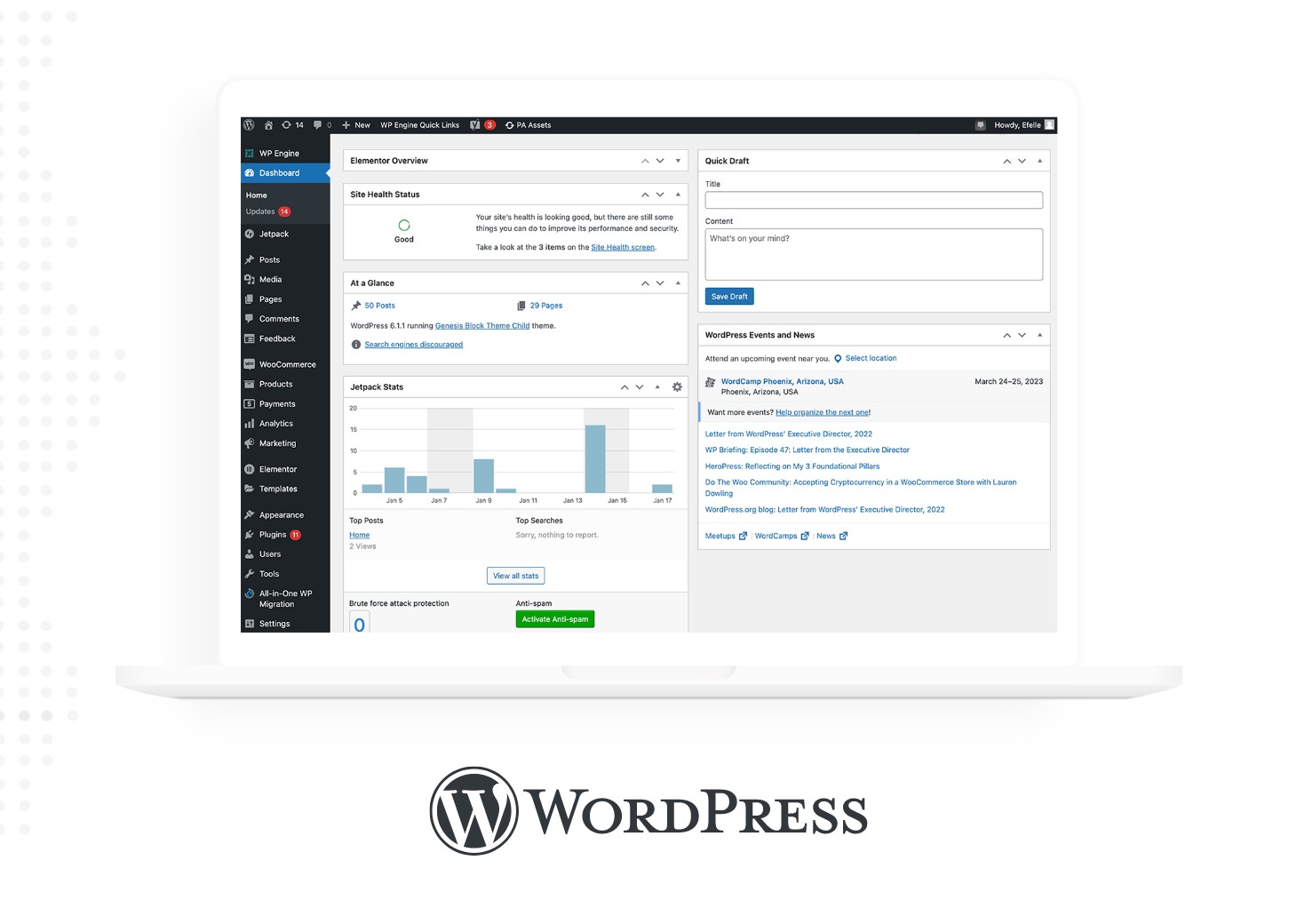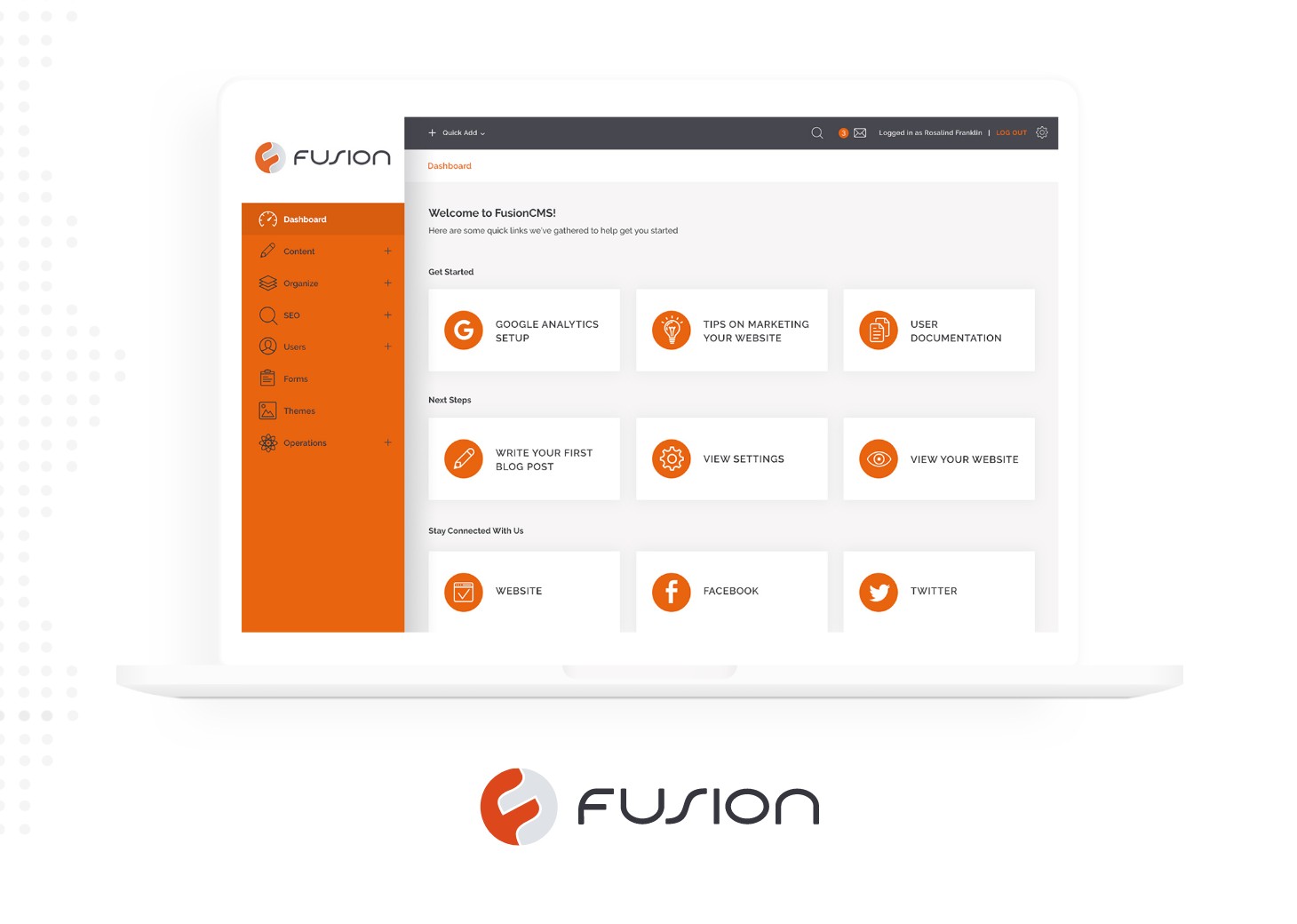A Quick Guide: Comparing FusionCMS with WordPress

Our team at efelle has a lot of experience building award-winning websites on both FusionCMS and WordPress, so we’re well equipped to discuss the pros and cons of each content management system with you. Here’s our breakdown.
What is a Content Management System?
A content management system (CMS) is a platform that allows website admins to create, edit and manage content on their website without the need for development or specialized skills. It allows you to change text, store images, create blog posts, update your team profiles and add portfolio items or case studies, among other things. A CMS needs to be both flexible and user-friendly to meet the variety of needs of your business and the individuals tasked with using it.

What is WordPress?
WordPress (WP) has evolved from a blogging platform into the most popular CMS on the market, with an estimated 43% market share. WordPress is “open source,” meaning its source code is made freely available for third-party apps to customize and develop plugins for it. This has led to an enormous ecosystem of over 50,000 specific plugins and hundreds of prebuilt “themes” that work with WordPress, giving businesses in a multitude of industries a tremendous amount of flexibility to build a website that works well for their specific needs.

What is FusionCMS?
Fusion is efelle’s proprietary CMS, originally developed back in 2007 as a user-friendly alternative to WordPress, with specific benefits geared towards professional service firms. It strikes a happy balance between performance, flexibility, and ease of use. In the years since, we’ve launched close to 700 websites on Fusion and are now operating on the 5th version of the CMS. We’ve developed modules specifically for professional service firms, such as Staff Profiles, Service Listings, Project Portfolios, and Location Pages, among others. This approach allows for an easy-to-use single dashboard interface to manage the entire website.
The Pros & Cons of FusionCMS
Pros:
- Single System: Integrated modules mean using a single system to manage what could otherwise require over a half-dozen separate systems, offering a unified experience. For example, by adding a Blog post and linking a Service, it will automatically pull the blog summary to the service page, producing “living” web pages that automatically push relevant, linked content to landing pages in real-time.
- Consistency: Utilizing integrated modules from a central dashboard also helps to ensure consistency within pages/sections, as opposed to using a WordPress page builder like Elementor, which offers a lot of flexibility, but can also create styling inconsistencies from page to page.
- Scalable: You don’t need to worry about maintaining styles, colors, fonts, or sections when creating new pages since all of your templates will be created so that you can simply fill in the blanks, and all styling will remain consistent site-wide.
- SEO: An SEO module allows users full control over anything SEO related from an easy-to-use interface, including all page titles, meta tags, and tracking codes.
- Support: All Fusion functionality is updated and maintained in-house via efelle’s team of developers, which means we’re not relying on third-party apps, which can often break when WordPress pushes major updates.
- eCommerce Integrations: Integration with BigCommerce (Headless eCommerce) is much stronger for eCommerce compared to WordPress + WooCommerce, and is an actively maintained and developed partnership.
- Enterprise Level Hosting: 99.99% Uptime SLA and Dual Cloud Hosting offer automatic load balancing and lightning-fast websites.
Cons:
- Flexibility: Less flexibility for new page-builder functionality; creating new pages that don’t follow one of the templates we created during the initial site build (a benefit of utilizing a WordPress page-builder tool like Elementor)
- Proprietary: As a proprietary tool, the FusionCMS theme code is not available to clients and could not be taken to other agency partners.
- Third-Party Apps: Some third-party apps, plugins, or APIs may not be compatible with Fusion unless we’re utilizing an iFrame or Script, which could mean some additional customization for API Connections.
- Shopify: No direct integration with Shopify at this time.
The Pros & Cons of WordPress
Pros:
- Familiarity: As the most popular CMS, many users are already familiar and comfortable with WordPress.
- Flexibility: WordPress sites can work well for all kinds of businesses and use cases, from freelancers to non-profits to government entities to enterprises.
- Plugins: An ecosystem of 55,000 third-party plugins (some of which are exclusive to WordPress).
- Themes: Hundreds of prebuilt themes, reducing the time and effort to create a new website.
- Open Source: You can take your existing WordPress site to other developers for updates.
- WooCommerce: Direct integration with WooCommerce for eCommerce functionality
- Cost: You could probably find a developer to whip up a cheap WordPress site overnight, but as the saying goes, “you get what you pay for.”
Cons:
- Updates: Because WordPress relies heavily on third-party plugins, anytime there is a core system update, it may negatively impact the compatibility of plugins, often breaking functionality without warning and requiring additional investigation and troubleshooting.
- Security: As the most popular CMS, WordPress is also the most targeted, with over 90,000 attempted attacks every minute, often with hack entry points via plugins.
- Fluff: Some themes might look nice but were built to be universal with unnecessary, heavy code. This decreases site speed and performance. Not all WordPress theme developers were created equal.
- Customization: It’s easy to “break” a WordPress theme if you’re attempting any customization, which could impact the consistency of your site or require developer assistance.
- Fees and Licenses: Many third-party apps, as well as common page builders like Elementor, require an additional licensing fee; in some cases, it’s an annual fee.
- Support: Plugins developed by third parties can have varying and inconsistent levels of support, upgrades, and documentation.
Which CMS is Better?
As you can see, “what’s the better CMS?” can be difficult to answer since it’s highly dependent on your specific business and team needs. While we’re partial to Fusion and continue to make improvements to the tool, our team also has a ton of experience building award-winning WordPress websites.
We’re always happy to offer a live demo and walkthrough of either CMS so you can get a better feel for the functionality and UX. Please reach out to us with any specific questions!